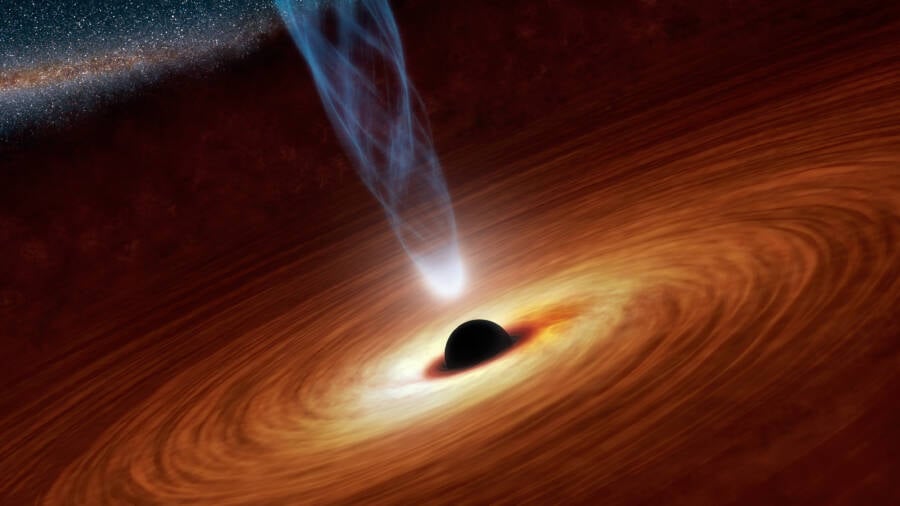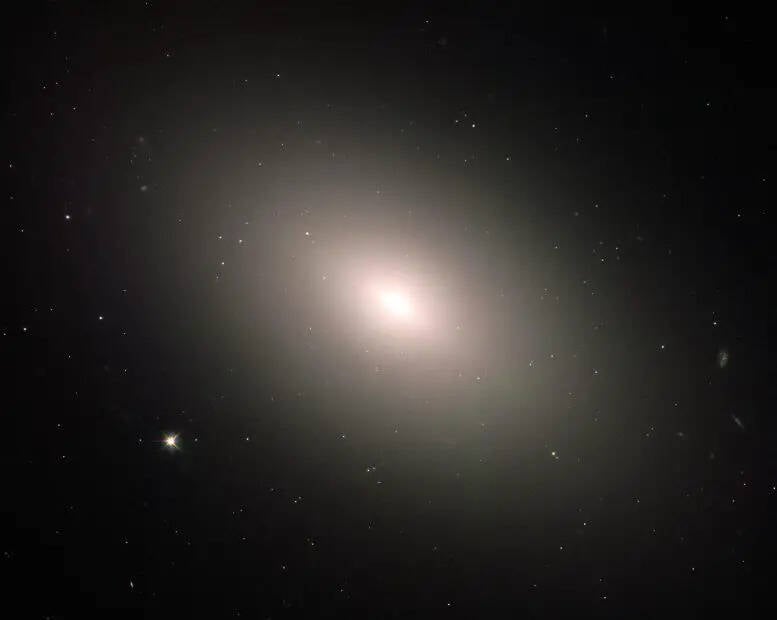A team of astrophysicists studied the growth of black holes — and may have found the origin of the dark energy driving the universe's expansion.

NASAArtistic rendition of a supermassive black hole.
For decades, scientists have puzzled over “dark energy,” an enigmatic force behind the expansion of the universe. Now, a team of 17 astrophysicists across nine countries just uncovered evidence pointing to a surprising origin of dark energy: black holes.
After the Big Bang created the universe 13.8 billion years ago, the energy from the explosion propelled materials across the universe. Early astrophysicists knew that the universe expanded rapidly at this time, but they assumed that it would gradually slow down due to the attractive force of gravity.
Then, in the 1990s, the Hubble Telescope redefined scientific understanding of the universe by revealing that it was expanding faster today than it was billions of years ago. This presented a problem for astrophysicists. If the force of gravity was pulling objects closer to each other, what was causing the universe to expand at a faster rate?
The scientific community determined that a mysterious force stronger than gravity, labeled “dark energy,” was propelling the universe to expand.
According to our current understanding, dark energy makes up about 68 percent of all matter in the universe. In comparison, normal matter makes up only 5 percent of the universe, and dark matter makes up about 27 percent.
Still, no researcher has been able to comprehensively describe what dark energy is, or where it came from. For years, people have theorized that it may stem from black holes, but this was a relatively radical theory without any scientific evidence. Until now.
A pair of studies, led by Duncan Farrah and Kevin Croker of the University of Hawaii and published in The Astrophysical Journal and The Astrophysical Journal Letters, shed new light on what might occur inside black holes.
“My interest in this project was really born from a general interest in trying to determine observational evidence that supports a model for black holes that works regardless of how long you look at them,” Farrah told SciTechDaily. “That’s a very, very difficult thing to do in general, because black holes are incredibly small, they’re incredibly difficult to observe directly, and they are a long, long way away.”
The team set out to measure the growth of black holes over billions of years. To do this, they would need to find old galaxies they could observe both early and late in their lifespan.
“You would have to identify a population of black holes and identify their distribution of mass billions of years ago,” study co-author and University of Michigan physicist Gregory Tarlé told SciTechDaily. “Then you would have to see the same population, or an ancestrally connected population, at present day and again be able to measure their mass. That’s a really difficult thing to do.”
The team settled on observing black holes in the middle of elliptical galaxies, some of the largest and oldest in the universe. Because these galaxies have typically used up their materials, leaving little for black holes to feed on, the black holes at the center of them should have slowed their growing process.
Instead, after examining the development of these galaxies over a span of billions of years, researchers found that the black holes had kept growing at baffling rates.

ESA/Hubble & NASA, P. CoteThe researchers studied the elliptical Messier 59 galaxy to determine if the black hole in its center had expanded throughout its 9 billion-year lifespan.
The team found that these black holes are anywhere from seven to 20 times bigger today than they were nine billion years ago, seemingly countering assumptions that it was only mass that fed their growth.
According to the team’s research, black holes essentially are “cosmologically coupling” with the universe: as black holes gain mass, the universe expands. In other words, black holes grow in conjunction with the expansion of the universe.
The team also suggested that instead of having a center that infinitely collapses, black holes contain and emit dark energy. In short, black holes may be the origin of the energy responsible for the universe’s growth.
According to ScienceAlert, the team worked to determine how much dark energy could be produced through this “coupling” process, and calculated that black holes were capable of producing enough to account for all the dark energy that exists in the universe today.
The team also pointed out that existing explanations for black hole behavior, such as black hole merging and gas accumulation, cannot sufficiently acount black hole evolution over billions of years.
“We’re really saying two things at once: that there’s evidence the typical black hole solutions don’t work for you on a long, long timescale, and we have the first proposed astrophysical source for dark energy,” Farrah told SciTechDaily.
Although the idea that black holes produce dark energy is not new, these studies are the first to present evidence pointing to “cosmological coupling” as the reason for the universe’s expansion.
This research also fits Albert Einstein’s proposed, and later discarded, theory that a “cosmological constant” worked against gravity and kept the universe from collapsing on itself.
Although more research must be done to test the team’s findings and determine their validity, astronomers are nonetheless excited to discover more possible answers to the secrets of universal expansion.
“If confirmed this would be a remarkable result, pointing the way towards the next generation of black hole solutions,” said Farrah to SciTechDaily.
“This measurement, explaining why the universe is accelerating now, gives a beautiful glimpse into the real strength of Einstein’s [theories],” Croker added. “A chorus of tiny voices spread throughout the universe can work together to steer the entire cosmos. How cool is that?”
After reading about this recent black hole discovery, discover six surreal things that might happen within a black hole. Then, read about how scientists measured the biggest black hole in the local universe.





